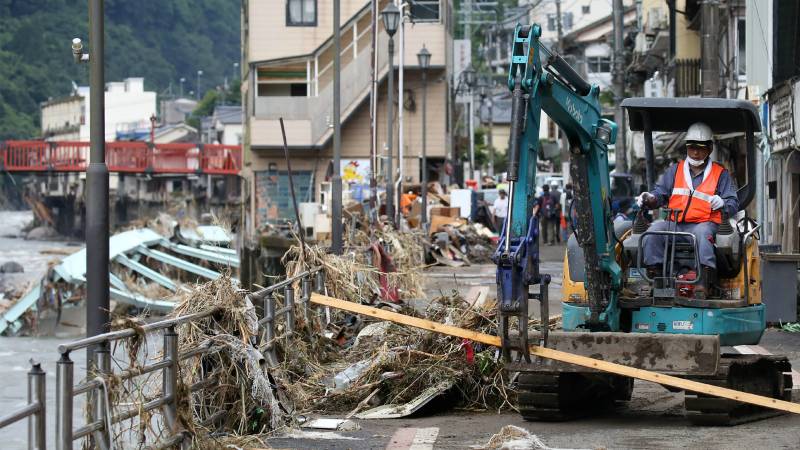Japan rescuers battle to reach thousands trapped by floods

Stay tuned with 24 News HD Android App

Japanese emergency services and troops scrambled Thursday to reach people cut off by catastrophic flooding and landslides that have killed dozens and caused widespread damage, with more torrential rain forecast.
In the scenic tourist area of Gifu in central Japan, officials said landslides and floodwater had left just nearly 1,000 households stranded -- or around 2,300 people. But in the hardest-hit region of Kumamoto, attention was turning to clean-up operations after some of the heaviest rain for years.
A Kumamoto official told AFP: "The number of people stranded is zero. We can now reach all the areas which had been isolated." An AFP reporter in the area saw part of a road collapsed into a river, and scenes of devastation in flood-affected houses.
In one home, an elderly man was struggling to clear up the debris and furniture littering the mud-caked floor, his traditional straw tatami mats in one room ruined. The rain front started in the southwest early Saturday and has since cut a swathe of destruction across Japan, dumping record amounts of rain and causing swollen rivers to burst their banks.
Japan's Meteorological Agency (JMA) said "heavy rain will likely continue at least until July 12, calling for "extreme vigilance" for possible landslides and flooding in low-lying areas. The JMA issued its second-highest evacuation order to around 350,000 people. Such orders are not compulsory, however, and most residents are choosing not to go to shelters, possibly due to coronavirus fears.
The death toll has climbed gradually as more victims are discovered in isolated areas. Government spokesman Yoshihide Suga told reporters that 58 people were confirmed dead. He said authorities were investigating whether four other deaths were linked to the floods, adding that 17 people were unaccounted for.
After five days blocked by floodwater and landslides, troops finally managed to rescue some 40 residents from Ashikita village in Kumamoto region. Kinuyo Nakamura, 68, burst into tears of relief as she finally made it to an evacuation centre. "Gosh, it was scary. My house, it's such a mess, I cannot live there anymore," she said as she came across someone she knew at the shelter. "We have experienced flooding disasters in the past many times. But this one doesn't compare," she told public broadcaster NHK.
Nakamura choked up as she explained that one of her neighbours had fallen victim to the floods. "A truly, truly, fantastic person," she said, covering her face to hide the tears. "That was the hardest thing."
'Hesitating to offer help'
In many areas, landslides reduced houses to rubble and floodwater rushed into homes in low-lying areas, destroying the contents and rendering them uninhabitable.
Prime Minister Shinzo Abe said that around 130,000 rescue workers and troops were battling to save lives. Complicating the rescue efforts, the coronavirus epidemic has claimed nearly 1,000 lives in Japan from more than 20,000 cases.
The need to maintain social distancing has reduced capacity at shelters and many have preferred to take refuge in their vehicles for fear of becoming infected. One emergency worker said the coronavirus might be dissuading people from volunteering to help with the rescue.
The latest natural disaster is a bitter blow for businesses in the hard-hit regions, already heavily reliant on tourism that has dried up due to the coronavirus. Japan is in the middle of its annual rainy season and often sees damaging floods and landslides during this period that lasts several weeks. However, experts say climate change is intensifying the phenomenon because a warmer atmosphere holds more water to dump in the form of rain.
